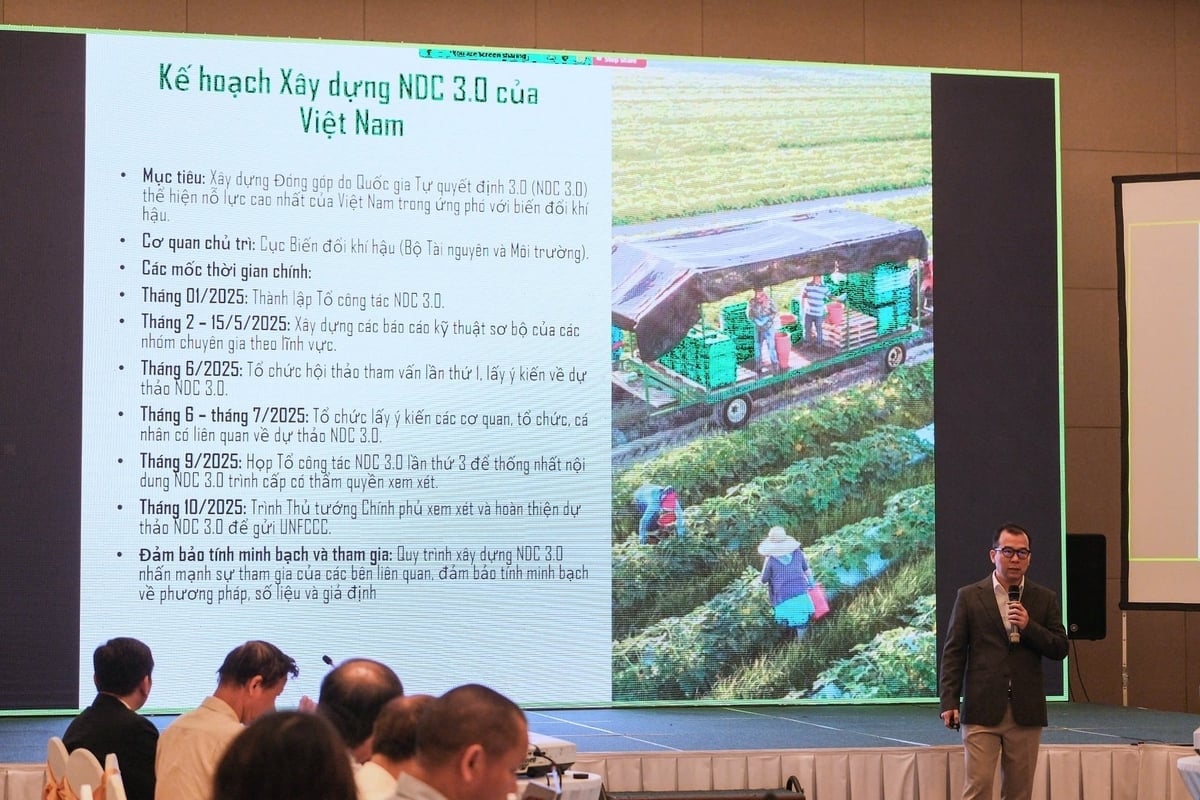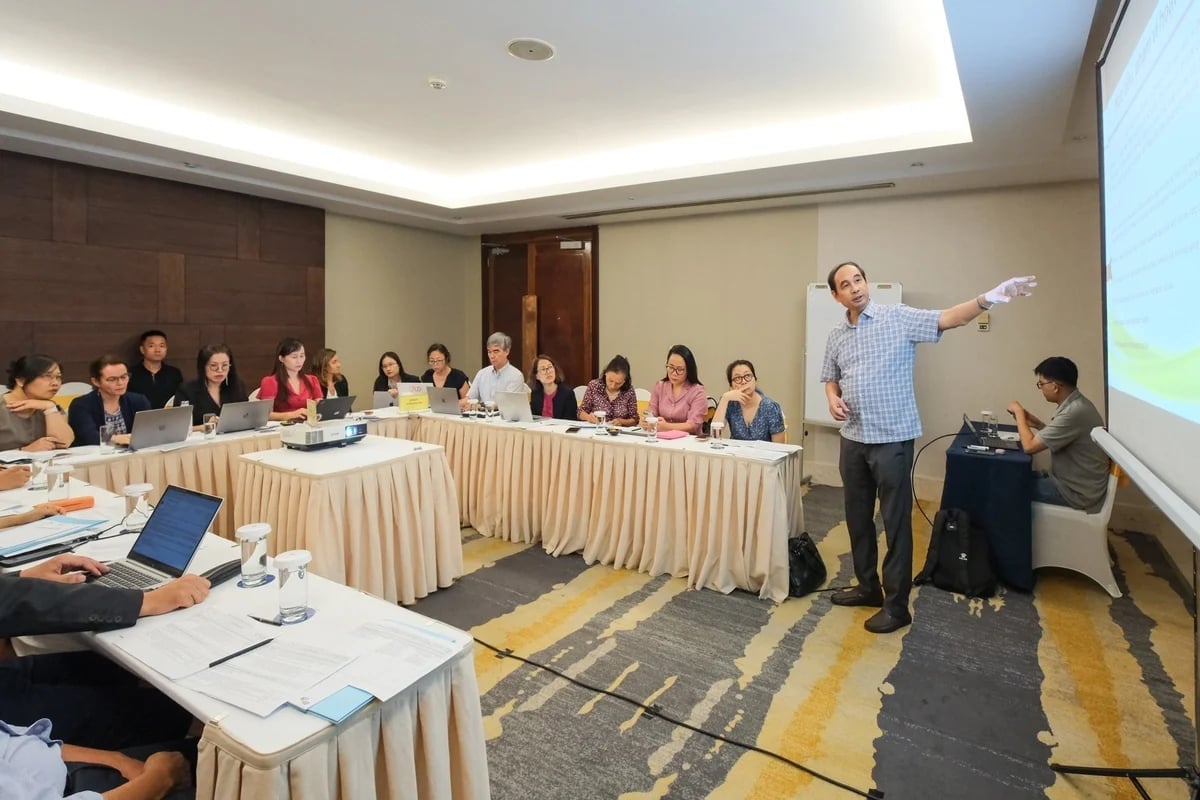December 5, 2025 | 17:16 GMT +7
December 5, 2025 | 17:16 GMT +7
Hotline: 0913.378.918
December 5, 2025 | 17:16 GMT +7
Hotline: 0913.378.918

Consultation Workshop on the Draft Project Implementation Plan (PIP) for the National Action Plan on Transparent, Responsible, and Sustainable Food Systems Transformation in Vietnam to 2030, organized by Vietnam Ministry of Agriculture and Environment and UNDP in Vietnam, took place on June 24. Photo: Quynh Chi.
At the consultation workshop on the Draft Project Implementation Plan (PIP) for the National Action Plan on Transparent, Responsible, and Sustainable Food Systems Transformation in Vietnam to 2030 held on June 24, co-organized by UNDP in Viet Nam and Ministry of Agriculture and Environment, Vietnamese and international experts discussed experiences in building inclusive institutional and policy frameworks. The workshop is hosted within the framework of UN Joint-SDG Programme "Promoting innovation in partnership mechanisms and financing for the transformation of the food system in Vietnam in the period 2024-2025”.
Presenting at the workshop, Mr. Luong Quang Huy - Head of the Greenhouse Gas Emission Reduction and Ozone Layer Protection Division under the Department of Climate Change (Ministry of Agriculture and Environment) - affirmed: "We define the NDC as a cross-ministerial, cross-sectoral task that requires the engagement of all relevant stakeholders. In particular, the agriculture sector plays a core role in both pillars: reducing greenhouse gas emissions and adapting to climate change."
Vietnam is currently drafting its NDC for the 2026-2030 period (NDC 3.0), which is expected to be completed ahead of the COP30, scheduled to take place in Belém, Brazil in November 2025. Department of Climate Change, the lead agency for drafting NDC 3.0, has outlined a roadmap for updating the NDC based on previous targets, including carbon neutrality and addressing greenhouse gas emissions with specific measures.
Since 2022, the Department of Climate Change has coordinated the review, measurement, and assessment of actual emission reductions from sustainable agriculture projects. Data shows that agriculture once accounted for nearly 30% of Vietnam’s total greenhouse gas emissions. However, by 2024, this share has decreased to approximately 19-20%, equivalent to over 100 million tons of CO2 equivalent.
According to Mr. Huy, this emission lowering is the result of scaling up various technical solutions for low-emission rice cultivation, such as the One Must, Five Reductions (1M5R) approach, alternate wetting and drying (AWD) irrigation, application of biotechnology in crop and livestock production, and improvements in soil management and afforestation.
"The agriculture sector has met and, in some points, exceeded the targets for unconditional emission reductions. The technical working group experts highly appreciate the potential solutions in crop production, livestock, and forestry through 2035," Mr. Huy emphasized.
Through the economic lens, Mr. Huy noted that circular agriculture is a key solution for pursuing the goal of reducing greenhouse gas emissions and achieving Net Zero by 2050 and also ensuring food security and increasing farmers' incomes. Models such as using agricultural by-products to produce organic fertilizers, reusing irrigation water, and integrating livestock with crop production need to be widely replicated across provinces and cities.

Associate Professor Dr. Dao The Anh chaired the discussion session of the working group on ecological agriculture. Photo: Quynh Chi.
According to Mr. Pham Ngoc Mau - Deputy Director of the International Cooperation Department (Ministry of Agriculture and Environment), Vietnam has established and actively operated 5 working groups and issued a monitoring and evaluation indicator set for implementing the National Action Plan (NAP-FST). At the same time, it is focusing on building provincial capacity and mainstreaming food system transformation plans at the local level.
"The merger of the Ministry of Agriculture and Environment creates favorable conditions to integrate food system transformation with the goals of reducing greenhouse gas emissions, adapting to climate change, and conserving local biodiversity," said Deputy Director Pham Ngoc Mau.
The Ministry has signed agreements with 47 domestic and international partners within the framework of the Food System Transformation Partnership Agreement (FST Partnership). This initiative contributes to achieving Sustainable Development Goals, ensuring food and nutrition security, reducing greenhouse gas emissions, and effectively adapting to climate change in Vietnam.
Vietnam's NDC 3.0 reflects a fair, responsible, and ambitious contribution, demonstrating the country’s highest level of effort in line with its socio-economic conditions. Accordingly, the sustainable and climate-resilient food system transformation plan will outline a roadmap for emission reduction, mitigating impacts on water security, and ensuring food security.
At the consultation workshop, delegates shared lessons learned on the transformation of the food system crossing countries, the implementation process of the National Action Plan (issued under Decision 300/QD-TTg) at the central and local governmental levels, and gave valuable comments on the draft Detailed Implementation Plan (PIP).
/2025/12/02/2629-3-141849_60.jpg)
(VAN) Based on its large-scale planted forests, several rubber enterprises have proactively conducted greenhouse gas emission inventories in preparation for entering the forest carbon credit market.

(VAN) MAE is leading in developing a national rare earth strategy, which will be submitted to the competent authorities for promulgation in early 2026.
/2025/12/02/4006-4-092040_652.jpg)
(VAN) The model of converting low-efficiency rice land to aquaculture in many localities has helped increase incomes by 5 to 15 times, improve the environment, and form new fisheries economic zones.

(VAN) Funded by ACIAR, Project FST/2020/123 focuses on measures to prevent harmful alien species, thereby protecting forests from invasive threats.

(VAN) The National Assembly's Supervisory Delegation pointed out solutions for the blue economy, circular economy, environmental protection, and technology application for sustainable marine governance.

(VAN) Lao Cai’s forestry sector is stepping into the spotlight with a series of pioneering initiatives in forest management, monitoring, and sustainable development aimed at generating carbon credits.

(VAN) The Provincial Competitiveness and Governance Index (PCGI) is a tool designed to reflect the quality of local governance.